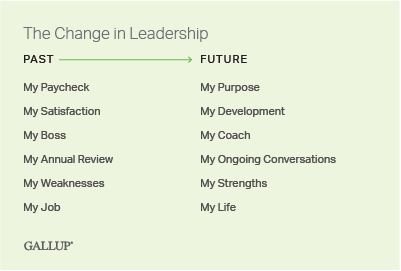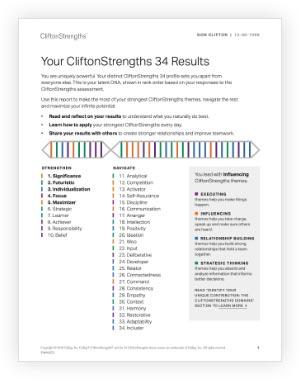Story Highlights
- There's one key factor every individual should look for in a career or when choosing a new career path
- The will of the workforce is changing, and employees want greater purpose
- CliftonStrengths explains your patterns of thought, feeling, behavior
It's graduation season, and all over the world, people are making the biggest decision of their lives: choosing a career and where to work. And many are making that decision without the information they need to make the right choice.
Before we go any further, let it be known that Gallup doesn't know what career path they should take either. In some sense, no one really does. This is a disrupted business climate, and whole labor categories are disappearing while others are being invented. The jobs outlook is murky. But Gallup does know what graduates -- and those already in the workforce -- should look for in a career.
The opportunity to do what they do best.
That's not a feel-good, "Go get 'em, kid" platitude. It's a fact. Scientists Kaori Fujishiro and Catherine A. Heaney, with the Centers for Disease Control and Prevention's National Institute for Occupational Health and Safety, found that people who frequently use their natural skills and abilities at work are happier and healthier. Gallup scientists found that people who use their talents (as measured by the CliftonStrengths assessment) at work are more engaged in their jobs and are three times more likely to report a high quality of life than those who do not.
So whatever career you choose, make sure it lets you do what you do best. Here's how.
1. Take the CliftonStrengths assessment.
Again, CliftonStrengths won't tell you what job you should have. Be suspicious of any assessment that does. Some job-placement personality tests or career tests are no more scientifically valid than astrology; some have been determined to "detect" pathologies that don't exist, while others are so poorly designed that the roles they recommend are a factor of the respondent's gender, race or education.
CliftonStrengths is different. Yes, it's been scientifically validated over and over again by independent testing agencies, but the practical difference is that it explains your innate patterns of thought, feeling or behavior that can be productively applied. "Productively" is key -- it's the reason so many companies around the world use it, and the reason it helps you plot your career. Those patterns indicate the kind of environment that you need in order to do what you do best every day, shine in your role and love your job.
You might, for instance, get energy from talking to lots of people, or from talking through lots of ideas, or both. You might get profound gratification from fixing a bad situation, or from making a good thing great, or neither. But a job that encourages you to use those patterns, whatever they are, will improve your whole life.
2. Ask hiring managers about their company culture.
A few decades ago, labor was happy enough with a job that offered good pay and a decent work environment, but today's employees want a whole lot more. Gallup calls it the new will of the workforce, and it upends organizational cultures that took decades or longer to build, demands a different approach to management from top to bottom, and radically alters business processes in ways big and small. To many leaders, it represents a drastic change.

To many young people, the old status quo is just baffling. Why would anyone want to work for a boss who fixates on weaknesses and only discusses progress once a year or so in a company with no real purpose?
A lot of companies still aren't prepared to meet the new will of the workforce. Gallup thinks that may be why 51% of U.S. employees are actively looking for a new job or are open to one, and why lack of development and career growth is the No. 1 reason people quit.
So, to determine if you'll be able to use your strengths, learn and grow, and get the coaching you want, you should get a fix on how closely the company culture hews to the new will of the workforce.
Ask recruiters and hiring managers how they define their company brand and how they activate their values so you'll know if you'll align with their purpose. Ask how the company develops its workers so you know if you'll learn and grow. Ask if managers are trained to coach employees' strengths or if they rely on command-and-control supervision. The answers will help you predict whether you'll get to do what you do best every day in a job you love.
Knowing Your Talent Is an Urgent Need
Incidentally, this goes double for graduates who mean to work for someone else long enough to garner the money and experience they need to launch their own enterprise. Most new companies fail -- don't let that scare you, it happens -- but the risk makes learning your talents even more urgent. Take Gallup's BP10 assessment to discover what you do best as a potential business builder. And for your first job out of school, pick a high-performance, high-development company. You'll learn more from the best than from the mediocre any day.
That's not a platitude, either. It's a fact. So is the advice to do what you do best. If you don't know what that is, find out. And then -- whether you want to work for someone or for yourself, whether you're after your first job or your best-ever one -- find work that lets you do what you do best every day and ultimately choose a job you love.
Seriously, every day. Gallup tested those words and discovered they make a world of difference. You might not get that job right away, but don't stop looking until you find it. Your ability to do what you do best matters, and so do you. That's very important information -- maybe the most important information -- to have when you're making the biggest decision you've ever made.
Learn more about using CliftonStrengths to help yourself and others succeed:
- Read more CliftonStrengths articles like this one.
- Sign up to get CliftonStrengths content sent directly to your inbox.
- Shop at store.gallup.com for CliftonStrengths access codes and other essential strengths-based development products.





